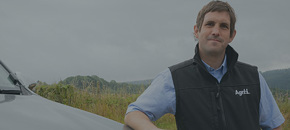
Talking Agronomy | Greg Taylor - February 2023
Blog - 01.02.23
Weather oscillating from one extreme to the other is underlining the value of the steady improvements we are making in the resilience of our soils and systems through ‘better farming’
– in particular, less tillage, wider rotations and organic matter-building.
After the ridiculous mildness of November and deep December cold followed by more unseasonal warmth, we have had plenty enough rain already. It turned cold again in mid-January, but only for a few days. And, before we know it, we will be into a spring that could well be bone dry again. Or very wet. Or very cold. Or all three, every other fortnight!
More than anything else, this puts the premium on having our eggs in several baskets – and very strong ones at that.
Nowhere has this been more evident than with our cover crops.
We have always valued diversity in our mixtures for the biology it builds. This season, though, broad species mixes have been as valuable for the assurance they have given us of decent development.
Especially useful here have been mixtures of larger-seeded cereals that cope better with early dryness, mustard that always seems to take-off well and vetches that come into their own later, combined with fibrous-rooting phacelia and deeper-penetrating linseed, tillage radish and sunflowers.
Well-grown though most of these covers were, the December cold opened them up nicely which should help with the glyphosate that will be going on as soon as we can travel.
Leaving them to die back naturally and drilling ‘on the green’ seemed logical approaches in our original ‘regen’ thinking. After several years of trial (and error) though, we know active, early destruction is crucial on our heavier soils to avoid wetness and trash getting in the way of drilling. So, the very last thing we need is to miss the early-spraying boat.
Another boat we can’t afford to miss is early winter crop top dressing.
All but our latest sown wheats are well-established and tillered. Considering the start they had, we have been remarkably fortunate with our OSRs too. And even the winter barley is standing-up well to the water-logging it never appreciates either.
Regardless of how much nutrition remains in our soils, the wetness has made it even more important all these crops get enough N, in particular, as soon as their growth picks-up. That way we have better rooted, stronger and heathier plants better able to use N more efficiently and stand-up to disease and pest pressures.
Early application is especially important with the slower-release urea we are having to rely on in place of AN these days. And – of course – in case everything turns dry again.
Not neglecting drainage while cutting back on cultivation has been the key to the much better ability much of our ground now has to withstand today’s weather pressures. Just like marathon running, it is a matter of building things steadily and getting the groundwork right. Which is why low disturbance metal at depth wherever and whenever necessary remains central to our heavy land recipe.
Bearing down hard on grassweeds is paying valuable dividends too in a season in which drilling ahead of much weed emergence may bring many wheat crops down to earth with a bump.
Yet again, we have found we cannot rely on the weather to give us a decent black-grass flush ahead of drilling. Instead, minimal seed return, the least soil disturbance at drilling and robust chemical alongside cultural controls means the earlier-drilled crops our whole weed management efforts are aimed at allowing remain pleasingly clean as well as well-grown. Fingers firmly crossed.
With such wet soils and CSFB larval uncertainties, our fingers are also well-crossed for the OSR as it goes into its ‘make-or-break’ time. While we can’t do anything about these pressures, managing the pigeons that are so often the straw that breaks the camel’s back remain another immediate priority.
Greg Taylor
Join Our Community

Agrii X
We love engaging with clients and partners. Give us a follow and let's share stories for the community.

Agrii Instagram
A picture paints a thousand words. Follow us on Instagram to see what we are up to.

Agrii Facebook
Follow us on the worlds biggest social media site for the latest news and events straight to your feed.

Agrii LinkedIn
If you are all about the business, connect with us on LinkedIn to build your network
Stay In Touch

Newsletter Sign-Up
Receive email updates on topical news and information from around Agrii and UK Farming.

Listen To Our Podcasts
Listen to the Tramlines Podcast. Fortnightly chat about agriculture and trials with your host Tony Smith.

Agrii Insights
Read essential agri intelligence for profitable farming.

Find an Event
Join us for our upcoming events and tours.



